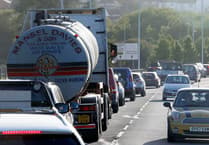POLITICIANS in Cardiff Bay have decided that the speed limit for built-up areas in Wales is to be set at 20 mph next year.
The new restrictions will apply to all residential streets and pedestrian streets with streetlights fewer than 200 yards apart, and the blanket restrictions will take effect next September.
The cost for this project is estimated at £32 million. No doubt the thinking is that this will be recouped by heavy-footed motorists who simply can’t come to grips with this lower national speed limit.
But is this limit wise?
This region of Wales is burdened with some of the worst roads in the country. It takes months, if not years, for repairs to be completed to stretches of road under the remit of Cardiff, and our local authorities have difficulty in finding the sums needed to complete road repairs in their respective jurisdiction.
With ambulance crews facing enormous pressure to offload patients waiting for hours in their vehicles, our Accident and Emergency departments over-burdened, our care system broken, is a spend of £32 million on 20mph zones really the best use of our tax funds?
There is an argument for certainly imposing 20mph restrictions outside schools and playgrounds, places of worship or on busy high streets, but that’s a far cry from simply saying 20mph and no more in our villages and towns.
What’s interesting is that when this proposal was opened up to public consultation, some 6,000 people responded. Of those, 53 per cent voiced opposition to the new blanket speed limit, with reasons including increased congestion, longer journey times and concerns it could “annoy” drivers. That last reason seems particularly trite.
The reality is that it is largely impossible now to travel above 20mph through our villages anyway. Get stuck behind a caravan or motorhome and an oncoming truck and you will gladly accept an average speed of 20mph.
Those politicians in Cardiff Bay would do well to reconsider this blanket move. Instead, impose it in areas where it’s needed and lay off putting in place everywhere.
It’s a waste of money. It will waste our time. And there are far more pressing issues that need urgent attention now.




Comments
This article has no comments yet. Be the first to leave a comment.